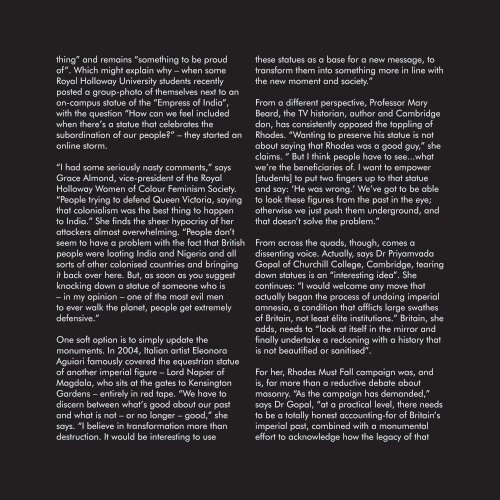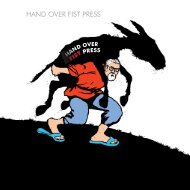- Page 1:
HAND OVER FIST PRESS SHEEP IN THE R
- Page 5 and 6:
This Volume’s CONTENTS ----------
- Page 7 and 8:
ANOTHER OPENING -------------------
- Page 9:
HAND OVER FIST PRESS SHEEP IN THE R
- Page 13 and 14:
The CONTENTS ----------------------
- Page 15 and 16:
OPENING ---------------------------
- Page 18 and 19:
6 SHEEP IN THE ROAD : NUMBER 3
- Page 20 and 21:
8 Hitler’s Nazis built concentrat
- Page 22 and 23:
10 SHEEP IN THE ROAD : NUMBER 3
- Page 24 and 25:
12 especially in Northern Ireland w
- Page 26 and 27:
1914-1918 World War One Allied prop
- Page 28 and 29:
16 But this ideological war about t
- Page 31 and 32:
Meanwhile, the BBC has confirmed th
- Page 33 and 34:
ARMAMENTS MANUFACTURERS MAKE A KILL
- Page 36:
a substantially undiscovered part o
- Page 39 and 40:
OCTOBER 2015 27
- Page 41 and 42:
OPINION ---------------------------
- Page 43:
Books are weapons! Hit a tory with
- Page 46:
34 he had been tucked up nicely in
- Page 50 and 51:
38 .3 “Get up”. A foot pushed h
- Page 52 and 53:
40 SHEEP IN THE ROAD : NUMBER 3
- Page 54 and 55:
42 just to save you two dobbers fro
- Page 56:
.4 Brad McGlaughlin. And I knew his
- Page 60:
So, as social beings inhabiting thi
- Page 63 and 64:
OPINION ---------------------------
- Page 65 and 66:
Bigger businesses will simply incre
- Page 67:
Stars are an important inclusion: t
- Page 70 and 71:
58 sprawling, bike on top of me, un
- Page 72 and 73:
60 SHEEP IN THE ROAD : NUMBER 3
- Page 74 and 75:
62 Ostensibly, Britain went to war
- Page 76 and 77:
64 On the African continent, South
- Page 78 and 79:
men) involved in the South West and
- Page 80 and 81:
68 Nowhere in Smuts’ report to th
- Page 82 and 83:
This wonderful piece of artwork fou
- Page 84 and 85:
72 SHEEP IN THE ROAD : NUMBER 3
- Page 86 and 87:
HAND OVER FIST PRESS 2 0 1 5
- Page 88 and 89:
Alan Rutherford 1984
- Page 90 and 91:
Alan Rutherford
- Page 92 and 93:
4 Alan Rutherford Don’t let this
- Page 94 and 95:
The collective principle asserts th
- Page 96 and 97:
8 services was nowhere near as gene
- Page 98 and 99:
hmm... tony still has those skeleto
- Page 100 and 101:
Alan Rutherford
- Page 102 and 103:
14 What’s going on here? Part of
- Page 104 and 105:
16 a hint at dickensian times to co
- Page 107 and 108:
That’s Why (we don’t comply wit
- Page 110:
22 Among other things they pointed
- Page 114:
26 Even faithful and simple Sancho
- Page 117 and 118:
I WALK THE LINE
- Page 119 and 120:
After your sharp, regular ribs, The
- Page 121 and 122:
Stop putting us in these fucking co
- Page 123 and 124:
Also at: www.disconnectedpress.co.u
- Page 127:
REVIEWED From Another Way of Tellin
- Page 131:
43 • The Portraits Chris Hoare is
- Page 135 and 136:
DECEMBER 2015 47
- Page 137 and 138:
DECEMBER 2015 49
- Page 141:
SERIALSCRIPT ----------------------
- Page 144 and 145:
56 The gunshot was loud against the
- Page 146 and 147:
Something you don’t read everyday
- Page 148 and 149:
The maritime world may be losing it
- Page 151 and 152:
NATURE ----------------------------
- Page 154 and 155:
66 SHEEP IN THE ROAD : NUMBER 4
- Page 156 and 157:
68 SHEEP IN THE ROAD : NUMBER 4
- Page 158 and 159:
70 SHEEP IN THE ROAD : NUMBER 4
- Page 160 and 161:
72 SHEEP IN THE ROAD : NUMBER 4
- Page 162 and 163:
74 Electrif Lycanthrope was the fir
- Page 165 and 166:
Alan Rutherford
- Page 167 and 168:
RANTING ---------------------------
- Page 169 and 170:
WAFFLE ----------------------------
- Page 171 and 172:
SHEEP IN THE ROAD XMAS 2015 5 A POV
- Page 173 and 174:
The CONTENTS ----------------------
- Page 175 and 176:
OPENING ---------------------------
- Page 177 and 178:
MENTION ---------------------------
- Page 179 and 180:
astute neversleeping masters made i
- Page 181:
Ours be the task to enlighten the i
- Page 184:
12 GET ON THE TRAIN From the standp
- Page 187 and 188:
...say what? 15 ‘I said, Assad mu
- Page 189 and 190:
XMAS 2015 17
- Page 191 and 192:
19 ALL TOGETHER NOW! XMAS 2015
- Page 193 and 194:
CAUTIONARY ------------------------
- Page 195 and 196:
From Ben Traven’s The Treasure of
- Page 197 and 198:
BLOODLUST -------------------------
- Page 199 and 200:
27 The unspeakable in pursuit of th
- Page 201 and 202:
dog units and lots of police cars w
- Page 203 and 204:
Once I started to feel better I ask
- Page 205 and 206:
Warwickshire Police were given foot
- Page 207 and 208:
XMAS 2015 35
- Page 209 and 210:
XMAS 2015 37
- Page 211 and 212:
Prejudice and faith have something
- Page 213 and 214:
XMAS 2015 41
- Page 215 and 216:
XMAS 2015 43
- Page 217 and 218:
XMAS 2015 45
- Page 219 and 220:
XMAS 2015 47
- Page 221 and 222:
XMAS 2015 49
- Page 223 and 224:
XMAS 2015 51
- Page 225 and 226:
XMAS 2015 53
- Page 227 and 228:
XMAS 2015 55
- Page 229 and 230:
XMAS 2015 57
- Page 231 and 232:
XMAS 2015 59
- Page 233 and 234:
RUST 61 XMAS 2015
- Page 235 and 236:
63 TOO XMAS 2015
- Page 237 and 238:
WAFFLE ----------------------------
- Page 239 and 240:
SHEEP IN THE ROAD JANUARY 2016 6
- Page 241:
The CONTENTS ----------------------
- Page 245:
MENTION ---------------------------
- Page 248:
and is no longer accessible first h
- Page 251 and 252:
www.caferoyalbooks.com crbnotes.wor
- Page 253 and 254:
HEAVEN HELP THOSE seeking in the AS
- Page 255:
JANUARY 2016 15
- Page 258 and 259:
highlighted in two publications of
- Page 260 and 261:
20 Anti-Capitalist Britain is a col
- Page 263 and 264:
AMBIGRAM --------------------------
- Page 265 and 266:
CONTEMPT --------------------------
- Page 267 and 268:
In the days leading up to the war,
- Page 269 and 270:
Although the Judge found our argume
- Page 271 and 272:
JANUARY 2016 31
- Page 273 and 274:
Ali Ismail Abbas, born 1991, is an
- Page 275 and 276:
JANUARY 2016 35
- Page 277 and 278:
elow: Roy Prockter, left: Birgit V
- Page 279 and 280:
elow: Simon Heywood, left: Sian Cwp
- Page 281 and 282:
JANUARY 2016 41
- Page 283 and 284:
NEWMAN ----------------------------
- Page 285 and 286:
BRIGHT LIGHTS ---------------------
- Page 287 and 288:
Dave was studying the patterns on t
- Page 289 and 290:
‘I never did tell you about Marcu
- Page 292 and 293:
The Branch Secretary 52 Cheltenham
- Page 294 and 295:
BRITISH 54 FOREIGN POLICY SHEEP IN
- Page 297 and 298:
FIBONACCI -------------------------
- Page 299 and 300:
CATASTROPHY -----------------------
- Page 301 and 302:
The fourth bomb’s recovery would
- Page 303:
63 After Palomares the USAF seems t
- Page 306 and 307:
NU R R N 66 U DE G OU D SHEEP IN TH
- Page 308 and 309:
68 REVIEW -------------------------
- Page 310 and 311:
70 The entrance to the exhibition i
- Page 312 and 313:
72 In the ‘Crossings’ section,
- Page 314 and 315:
74 Then we head into the pertinent
- Page 316 and 317:
76 SHEEP IN THE ROAD : NUMBER 6
- Page 318 and 319:
HAND OVER FIST PRESS 2 0 1 6
- Page 320 and 321:
SHEEP IN THE ROAD : NUMBER 7
- Page 323 and 324:
OPENING ---------------------------
- Page 325 and 326:
They are wrong Lets join together W
- Page 327:
7 Nobody is doing what Joe Sacco is
- Page 330 and 331:
10 Later in life, in my trampship t
- Page 332 and 333:
12 Coke financially supported the N
- Page 334 and 335:
14 In the 1930s, Hugo Boss started
- Page 336 and 337:
16 ‘situation’, they really nee
- Page 340 and 341:
20 EXPLOITED ----------------------
- Page 342 and 343:
Endi Poskovic ... the juxtaposition
- Page 344 and 345:
long-dead stars. where the other bu
- Page 346 and 347:
26 Most of the stars in the sky, in
- Page 348 and 349:
28 stars, there will only be one su
- Page 350 and 351:
30 SHEEP IN THE ROAD : NUMBER 7
- Page 352 and 353:
32 REVIEW -------------------------
- Page 354 and 355:
34 SHEEP IN THE ROAD : NUMBER 7
- Page 356 and 357:
36 SHEEP IN THE ROAD : NUMBER 7
- Page 359 and 360: SHITARTICLE -----------------------
- Page 361 and 362: Anarchists suggest that humans are
- Page 363 and 364: UNDERGROUND 43 FEBRUARY 2016
- Page 365 and 366: ‘Of course, the representation of
- Page 367 and 368: 95 percent of Brit Expats Sent Back
- Page 369 and 370: FEBRUARY 2016 49
- Page 371 and 372: JUST ANOTHER SHORT STORY Photograph
- Page 373 and 374: FEBRUARY 2016 53
- Page 375 and 376: was quite well paid at the Dunlop f
- Page 377 and 378: farewells to friends of convenience
- Page 379 and 380: FEBRUARY 2016 59
- Page 381 and 382: WAFFLE ----------------------------
- Page 383 and 384: 8 EUROSCEPTICS SHEEP IN THE ROAD EA
- Page 385: The CONTENTS ----------------------
- Page 388 and 389: 4 SHEEP IN THE ROAD : NUMBER 8
- Page 390 and 391: It was to that end that we set abou
- Page 392 and 393: 8 SHEEP IN THE ROAD : NUMBER 8
- Page 394 and 395: of roasting rabbit filled the house
- Page 396 and 397: 12 SHEEP IN THE ROAD : NUMBER 8
- Page 398 and 399: ‘I must stay - to protect you and
- Page 402 and 403: 18 SHEEP IN THE ROAD : NUMBER 8
- Page 404 and 405: 20 When I arrive on the Strand to b
- Page 406 and 407: 22 Britain’s response to what is
- Page 410 and 411: 26 Photograph: Alan Rutherford Chic
- Page 412 and 413: 28 AGE-OLD QUESTION? MARTIN TAYLOR
- Page 414 and 415: the wasps and flies could get in th
- Page 416 and 417: 32 SHEEP IN THE ROAD : NUMBER 8
- Page 419 and 420: FOLLY -----------------------------
- Page 421 and 422: REFERENDUM? DEMOOCRACY? ASK ME SOME
- Page 423 and 424: They did not want to provoke a resp
- Page 425 and 426: That is the tragedy of this referen
- Page 427 and 428: EASTER 2016 43
- Page 429 and 430: DON’T MARK HIS FACE Hull Prison R
- Page 431 and 432: EASTER 2016 47
- Page 433 and 434: and screamed at me to get away from
- Page 435 and 436: EASTER 2016 51
- Page 437 and 438: DUBLIN EASTER 1916 Edited from an a
- Page 439 and 440: British military forces in Ireland,
- Page 441 and 442: The effect of the book, as each chi
- Page 443 and 444: EASTER 2016 59
- Page 445 and 446: 61 161 EASTER 2016
- Page 447 and 448: WAFFLE ----------------------------
- Page 449 and 450: 9 SHEEP IN THE ROAD APRIL 2016 STIL
- Page 451: The CONTENTS ----------------------
- Page 454 and 455: ... at its core, the cylinder too i
- Page 456 and 457: Photograph: Alan Rutherford
- Page 458 and 459:
8 In 1649 Gerrard Winstanley and 14
- Page 460 and 461:
Royal is a new imprint within Café
- Page 462:
Nils Burwitz Namibia: Heads or Tail
- Page 466 and 467:
CONSTRUCT-IVISM El Lissitzky was on
- Page 468 and 469:
Artwork: Shepard Fairey
- Page 471 and 472:
UTTER FOLLY -----------------------
- Page 473 and 474:
volatile things, and tampering with
- Page 475 and 476:
In the end, our captivity lasted un
- Page 477 and 478:
a city of iron and fire oozing kero
- Page 479 and 480:
to be targeted, but increasingly de
- Page 481 and 482:
in the pockets of economic deprivat
- Page 483 and 484:
33 by Edmund at nevercomedowncomix.
- Page 485 and 486:
35 APRIL FOOL 2016
- Page 487 and 488:
37 APRIL FOOL 2016
- Page 489 and 490:
39 The images and the comic as a wh
- Page 491 and 492:
INTERVIEW -------------------------
- Page 493:
D. You know, these are great storie
- Page 503:
This building once housed Cheltenha
- Page 512 and 513:
what he really wanted to talk about
- Page 514 and 515:
Photograph: Delia McDevitt
- Page 516 and 517:
and visionaries had been shot in 19
- Page 518 and 519:
68 SHEEP IN THE ROAD : NUMBER 9
- Page 520:
HAND OVER FIST PRESS 2 0 1 6

















